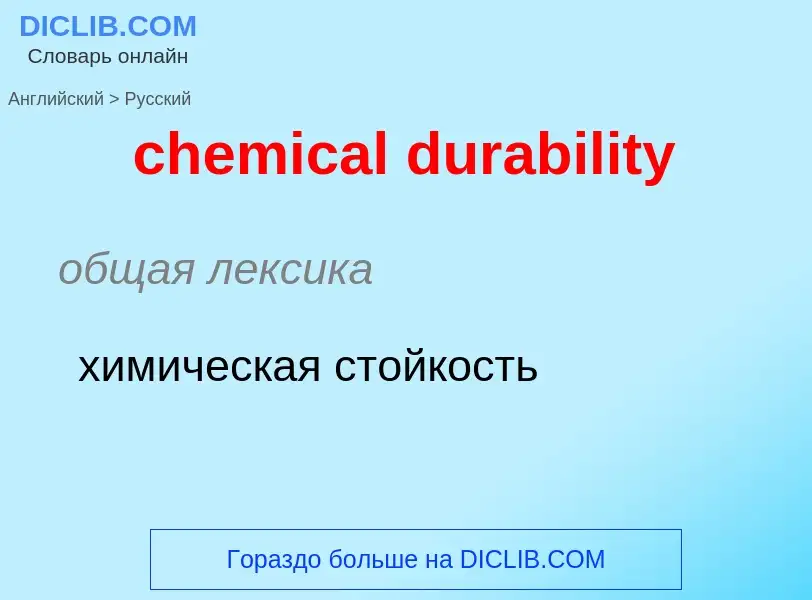Translation and analysis of words by ChatGPT artificial intelligence
On this page you can get a detailed analysis of a word or phrase, produced by the best artificial intelligence technology to date:
- how the word is used
- frequency of use
- it is used more often in oral or written speech
- word translation options
- usage examples (several phrases with translation)
- etymology
chemical durability - translation to russian
общая лексика
химическая стойкость
[kə'rəudiŋ]
общая лексика
корродирующий
коррозионный
прилагательное
специальный термин
корродирующий
Definition
Wikipedia
Corrosion is a natural process that converts a refined metal into a more chemically stable oxide. It is the gradual deterioration of materials (usually a metal) by chemical or electrochemical reaction with their environment. Corrosion engineering is the field dedicated to controlling and preventing corrosion.
In the most common use of the word, this means electrochemical oxidation of metal in reaction with an oxidant such as oxygen, hydrogen or hydroxide. Rusting, the formation of iron oxides, is a well-known example of electrochemical corrosion. This type of damage typically produces oxide(s) or salt(s) of the original metal and results in a distinctive orange coloration. Corrosion can also occur in materials other than metals, such as ceramics or polymers, although in this context, the term "degradation" is more common. Corrosion degrades the useful properties of materials and structures including mechanical strength, appearance, and permeability to liquids and gases.
Many structural alloys corrode merely from exposure to moisture in air, but the process can be strongly affected by exposure to certain substances. Corrosion can be concentrated locally to form a pit or crack, or it can extend across a wide area, more or less uniformly corroding the surface. Because corrosion is a diffusion-controlled process, it occurs on exposed surfaces. As a result, methods to reduce the activity of the exposed surface, such as passivation and chromate conversion, can increase a material's corrosion resistance. However, some corrosion mechanisms are less visible and less predictable.
The chemistry of corrosion is complex; it can be considered an electrochemical phenomenon. During corrosion at a particular spot on the surface of an object made of iron, oxidation takes place and that spot behaves as an anode. The electrons released at this anodic spot move through the metal to another spot on the object, and reduce oxygen at that spot in presence of H+(which is believed to be available from carbonic acid (H2CO3) formed due to dissolution of carbon dioxide from air into water in moist air condition of atmosphere. Hydrogen ion in water may also be available due to dissolution of other acidic oxides from the atmosphere). This spot behaves as a cathode.

![climbing descender]] is anodized with a yellow finish. climbing descender]] is anodized with a yellow finish.](https://commons.wikimedia.org/wiki/Special:FilePath/Belaying8.jpg?width=200)
![electrified railway]] line electrified railway]] line](https://commons.wikimedia.org/wiki/Special:FilePath/Corroding Steel Electrification Gantry.jpg?width=200)
![The US military [[shrink wrap]]s equipment such as helicopters to protect them from corrosion and thus save millions of dollars The US military [[shrink wrap]]s equipment such as helicopters to protect them from corrosion and thus save millions of dollars](https://commons.wikimedia.org/wiki/Special:FilePath/Corrosion protection.jpg?width=200)
![type 316 stainless steel]]) of a heat exchanger in a seawater desalination plant type 316 stainless steel]]) of a heat exchanger in a seawater desalination plant](https://commons.wikimedia.org/wiki/Special:FilePath/Crevice corrosion of 316 stainless steel in desalination.jpg?width=200)

![Galvanized]] surface Galvanized]] surface](https://commons.wikimedia.org/wiki/Special:FilePath/Galvanized surface.jpg?width=200)

![[[Gold nugget]]s do not naturally corrode, even on a geological time scale. [[Gold nugget]]s do not naturally corrode, even on a geological time scale.](https://commons.wikimedia.org/wiki/Special:FilePath/GoldNuggetUSGOV.jpg?width=200)
![These [[neodymium magnet]]s corroded extremely rapidly after only 5 months of outside exposure These [[neodymium magnet]]s corroded extremely rapidly after only 5 months of outside exposure](https://commons.wikimedia.org/wiki/Special:FilePath/NdFeB corrosion.jpg?width=200)
![[[Ozone cracking]] in [[natural rubber]] tubing [[Ozone cracking]] in [[natural rubber]] tubing](https://commons.wikimedia.org/wiki/Special:FilePath/Ozone cracks in tube1.jpg?width=200)






